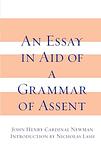John Henry Newman
John Henry Newman was a 19th-century theologian, poet, and Catholic cardinal. Originally an Anglican priest, he was a leading figure in the Oxford Movement, which sought to return the Church of England to its Catholic roots. Newman converted to Catholicism in 1845 and was later made a cardinal by Pope Leo XIII. He was also a prolific writer and influential thinker, and his works include 'Apologia Pro Vita Sua' and 'The Idea of a University'. Newman was canonized as a saint in the Catholic Church in 2019.
Books
This list of books are ONLY the books that have been ranked on the lists that are aggregated on this site. This is not a comprehensive list of all books by this author.
-
1. Apologia Pro Vita Sua
The book in question is a profound religious autobiography that presents a defense of the author's spiritual journey from Anglicanism to Roman Catholicism. Written in response to criticism from an Anglican clergyman, the work meticulously details the author's theological reflections and the intellectual struggles that led to his conversion. It stands as a significant document of the religious controversies of the 19th century and offers insight into the author's personal convictions and the broader religious landscape of the time. The narrative is both a personal apologia and a broader exploration of faith and doctrine, reflecting the author's commitment to his beliefs and his desire to explain and justify his spiritual evolution to his contemporaries.
The 7160th Greatest Book of All Time -
2. A Grammar Of Assent
The book in question is a philosophical treatise on the nature of faith and the process by which individuals come to believe in religious doctrines. It explores the distinction between notional assent, which is intellectual agreement with an idea, and real assent, which is a deeper, more personal conviction. The author argues that faith is not solely based on logical deduction or empirical evidence but also involves a personal commitment that transcends purely rational understanding. This commitment, or real assent, is characterized by its certitude and the role of the conscience in apprehending religious truths. The work is a significant contribution to the philosophy of religion and the understanding of the role of faith in human cognition and action.
The 7160th Greatest Book of All Time -
3. The Idea Of A University
The book is a seminal work on higher education that explores the purpose, nature, and scope of a university's role in intellectual life. It presents a vision of university education as a place for cultivating the intellect and character, rather than merely a means to an end or a vocational training center. The author argues for the importance of liberal education, which provides a broad and holistic approach to learning, enabling students to develop their minds and moral sense. Through a series of discourses, the work defends the idea that the pursuit of knowledge for its own sake is valuable and that a university should be a community of thinkers, engaging in intellectual culture, and promoting academic discourse without succumbing to external pressures.
The 7160th Greatest Book of All Time


